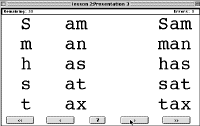

"The other side - the side that's looking to return to the 1960s - is currently winning the campaign," warned Allington. Moving back to 1960 isn't going to get us where we need to go."

Moving back to the approach of the 1960s is not progress. We can do better still, but we can't go backwards. "Let's not throw out the gains we've made. "Lots is being said about what's wrong with American education, but little is being said about what's right," adds Richard Allington, professor of education at the State University of New York at Albany and author of many books including Schools That Work and Classrooms That Work. "My students' parents know I'm teaching phonics phonics is everywhere," says Routman, encouraging others to get the word out. "In some places, 'back to basics' has moved in because whole language wasn't understood." "Communication is important," Routman added. They didn't inform parents that "whole language doesn't mean no phonics." (Click here to read a review of Invitations and The Blue Pages.)Įducators didn't inform parents "why" they were using literature-based reading programs, points out Routman. Routman's books include Literacy at the Crossroads, Invitations, Transitions, and The Blue Pages: Resources for Teachers. "We didn't bring our students' parents on board!" says Routman, a language arts teacher in Shaker Heights, Ohio, and an anointed guru of the literature-based movement. Teachers made a big mistake, Routman admitted in her conference-opening keynote: They didn't communicate. That "educators must band together to get out their message" was the thrust of keynotes delivered by speakers such as Pearson, Richard Allington, and Regie Routman. Indeed, conciliation was a theme expressed by three keynote speakers at the conference. "This is not a debate to be won, but rather a conversation to be held," Pearson suggested. "If not, the voices from the far sides will be the voices that will be heard - and ONE side will win!" "Join me in the Radical Middle," Pearson repeated. They've already made inroads in states such as California, where legislation mandating a phonetic approach to teaching reading has been passed. Pearson, professor of education at Michigan State University, warned the gathering that the phonics troops are gaining ground. David Pearson's rallying cry at the annual conference of the New England Reading Association, held October 23-25 in Hartford, Connecticut. David Pearson put out a warning call to teachers in keynotes last week at the New England Reading Association Annual Conference. Nationally recognized reading experts Regie Routman, Richard Allington, and P. A Call to Teachers of Literature-Based Reading Programs: The Phonics Brigade Is Moving In! Marshall Your Forces!


 0 kommentar(er)
0 kommentar(er)
